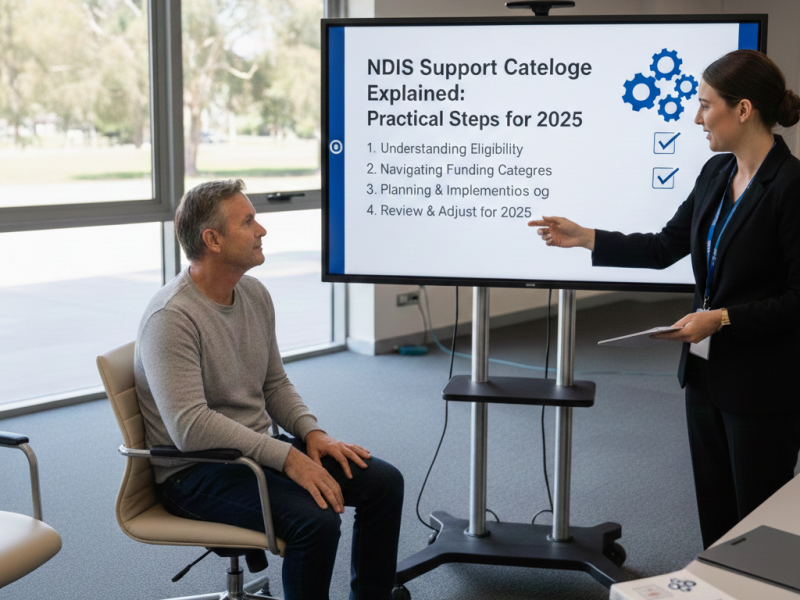The National Disability Insurance Scheme (NDIS) Pricing Arrangements and Price Limits (Pricing Arrangements) provide the guidelines under which NDIS Registered Providers handle cancellations of scheduled supports and services. A cancellation occurs when a Participant cancels a booked support, or simply does not attend.
Short Notice Cancellation
A short-notice cancellation occurs when a Participant cancels, or does not attend, inside the required notice window for the booked support.
Where a short-notice cancellation has occurred, a Provider may charge up to 100 percent of the agreed fee:
- when the Service Agreement sets out the cancellation terms
- the worker could not be redeployed to other billable work
- the worker still had to be paid for that time.
There are two notice windows. For many therapy and other non–disability support worker items, short notice means less than two clear business days. For most disability support worker items, short notice means less than seven days.
Claims are made against the same support item that would have been used if the service proceeded, using the cancellation option in the portal. There is no fixed limit on the number of claims, but the National Disability Insurance Agency monitors unusual patterns and expects Providers to follow up where cancellations become frequent.
Conditions To Be Met to Claim Short Notice Cancellations
A claim is only permitted when all required conditions are met. The notice provided by the Participant must fall inside the applicable short-notice window for the support item. The Provider must have been unable to find alternative billable work for the relevant worker for that time. Where the Provider engages staff, the Provider must still have been required to pay the worker for the time that would have been spent providing the support.
The Service Agreement with the Participant must set out the cancellation terms that match the Pricing Arrangements, and the Participant must have agreed to those terms. Providers may choose to waive the fee in light of individual circumstances and may also choose to offer more generous notice periods in their own policy.
Steps to Claim Short Notice Cancellations
- Step 1: Confirm the support item and the correct notice window for that item (two clear business days or seven days).
- Step 2: Check the time the cancellation was received and determine whether it falls within the short-notice window. For “two clear business days,” exclude weekends and public holidays; for “seven days,” public holidays do not change the seven-day requirement.
- Step 3: Attempt to reschedule the Participant and, in parallel, attempt to redeploy the worker to other billable work. Keep a record of what was attempted and the outcome.
- Step 4: If redeployment was not possible and the worker still had to be paid, raise the claim using the same support item and select the cancellation option in myplace. Charge no more than the agreed fee.
- Step 5: Record all evidence in the Participant file: the original booking, the time and method of the cancellation, attempts to reschedule, attempts to redeploy, and the invoice line with the cancellation code.
- Step 6: If a Participant’s cancellations become frequent, complete a welfare check and review supports before continuing to charge fees.
Timing examples for staff training:
- Two clear business days: an appointment at 10:00 am Tuesday following a Monday public holiday requires notice before 10:00 am on the prior Thursday to avoid a fee. Notice given after 10:00 am Thursday is short-notice.
- Seven days: a support at 10:00 am Tuesday requires notice before 10:00 am on the prior Tuesday. Public holidays within that period do not alter the seven-day calculation.
Want to Attract More NDIS Clients?
Get expert advice on how to market your services, connect with clients, and grow your practice.
Group-based supports and Programs of Support
Group-based supports and Programs of Support have additional rules. If a Participant cancels from a group session and no replacement can be found, the cancelling Participant can be billed at the previously agreed rate when all short-notice conditions are met, and the rest of the group is billed as though the full group attended. Programs of Support are not subject to short-notice cancellation rules, but Participants must be able to exit a program with up to two weeks’ notice, and non-attendance without notice can only be claimed for a limited period. This guide explains the conditions that must be met, the steps to claim correctly, how to remain compliant through clear Service Agreements and records, and practical strategies to manage cancellations.
Remaining Compliant
Service Agreements must set out the exact notice window for each support type delivered, define “clear business days,” state acceptable cancellation channels and cut-off times, and explain that short-notice cancellations may be charged where the worker cannot be re-deployed and must be paid.
Registered Providers must not add fees beyond what the Pricing Arrangements permit; do not add gap fees, surcharges, late payment fees, or exit fees. For supports delivered to a group, if one Participant cancels and the Provider cannot find a replacement and all other short-notice requirements are met, they may bill the cancelling Participant at the previously agreed rate as if they attended, and bill the other Participants as though the full group attended. For Programs of Support, follow the program rules documented with the Participant; short-notice cancellation rules do not apply to instances delivered under a Program of Support, but Participants must be able to exit a program with up to two weeks’ notice and missed attendance without notice can only be claimed for up to four consecutive weeks. Always keep accurate records and apply discretion where appropriate.
Good Strategies for Handling NDIS Cancellations
Set clear, plain-English cancellation terms in every Service Agreement and repeat them in booking confirmations. Use reminder systems that state the exact cut-off time for avoiding a fee, and offer simple cancellation channels such as SMS or email. Maintain a standby list so workers can be redeployed quickly when a booking is cancelled. For group work, consider using Programs of Support with documented outcomes, review points, exit rules and notice, which reduces the operational impact of missed sessions. Train staff on calculating “two clear business days” and “seven days,” on what counts as reasonable redeployment attempts, and on respectful communication when cancellations occur. Review cancellation claims monthly for correctness and trends, and track metrics such as reschedule rate, redeployment rate and number of waivers granted, then adjust rostering and communication accordingly.
Referrals Start With Reputation – We’ll Help You Build Both
From networking tips to service refinement, we guide NDIS providers toward lasting impact.
Conclusion
Clear, consistent cancellation terms protect Participants and keep Providers compliant. Document the correct notice window for each support delivered, explain how “two clear business days” and “seven days” are calculated, and spell out when a fee may be charged. In operations, time-stamp every cancellation, try to reschedule the Participant and redeploy the worker, and only claim when all conditions are met using the correct item with the cancellation flag. Monitor patterns, follow up where cancellations become frequent, and use Programs of Support for group work where appropriate. Good documentation and respectful communication are the keys to audit-ready, defensible cancellation practices.
FAQs
1. What is a short-notice cancellation?
A short-notice cancellation is when a Participant cancels or does not attend inside the required notice window for the support item. For many therapy and other non–disability support worker items it is less than two clear business days. For most disability support worker items it is less than seven days.
2. When can a Provider charge a cancellation fee?
Only when the Service Agreement includes cancellation terms that match the Pricing Arrangements, the notice given is inside the short-notice window, the Provider could not find alternative billable work for the worker, and, where staff are employed, the worker still had to be paid for that time.
3. How do Providers calculate “two clear business days”?
Exclude weekends and public holidays and count full business days before the appointment time. For a 10:00 am Tuesday appointment after a Monday public holiday, notice must be received before 10:00 am on the prior Thursday to avoid a fee.
4. Do public holidays change the seven-day window?
No. Seven days is a simple day-count back from the appointment time. Public holidays inside that week do not alter the requirement.
5. How do Providers submit a cancellation claim in myplace?
Use the same support item that would have been used if the service proceeded and select the cancellation option. Do not exceed the agreed price for that booking.
6. Is there a limit on the number of cancellation claims?
There is no set cap, but Providers are expected to monitor unusual patterns, check on Participant wellbeing, and address causes rather than automatically charging each time.
7. What evidence should Providers keep for their audit?
Keep the original booking confirmation, the time and method the cancellation was received, calculations showing the notice window, records of attempts to reschedule and redeploy the worker, proof the worker had to be paid (where applicable), and the invoice line showing the cancellation code.
8. How do group-based supports work when one Participant cancels?
If a Participant cancels and a replacement cannot be found, and all other short-notice conditions are met, the Provider may bill the cancelling Participant at the previously agreed rate as if they attended. Other Participants should be billed as though the full group attended.
9. Do short-notice rules apply in a Program of Support?
No. For instances delivered under a Program of Support, the Provider may claim as if the Participant attended provided they had capacity to deliver that instance. Participants must be able to exit a program with up to two weeks’ notice. If they stop attending without notice, the Provider may continue claiming for up to four consecutive weeks before stopping unless they confirm they wish to continue.
10. Can a Provider waive a cancellation fee or offer a longer notice period?
Yes. Providers may choose to waive fees due to individual circumstances and may set a more generous notice period in their own policy, provided terms are clearly explained in the Service Agreement.
11. Can Providers add other charges such as gap fees, surcharges, late fees or exit fees?
No. Registered Providers must not add fees beyond what the Pricing Arrangements permit. Only cancellation fees allowed by the Pricing Arrangements and agreed in the Service Agreement may be charged.


